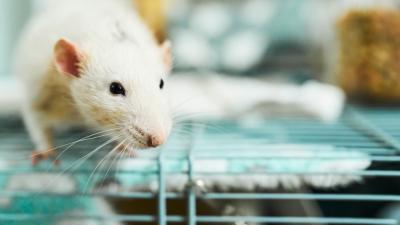Former Macalester College Animal Lab Workers, Alumni, and Mental Health Experts Raise Alarm Regarding Student Stress and Coercion in Deadly Animal Experiments

ST. PAUL, Minn. — Former Macalester College animal laboratory workers joined distinguished alumni and more than 130 mental health professionals and animal welfare experts to call on Macalester President Suzanne Rivera, PhD, and other college leaders to protect students from psychological harm and end fatal animal experiments in psychology courses. Their letter, sent Sept. 4 as Macalester students begin classes, cites a new national survey that finds serious student intimidation with regard to participation in animal laboratories, as well as the risk of long-term harm to students working in the laboratory.
The OpinionWorks survey found that 83% of U.S. college students believe that animals should not be used in classroom teaching laboratories if the animals are killed afterward and if other methods can teach the same material without using animals. Yet 44% feel coerced into participating in the deadly experiments: 20% stated they would participate anyway to avoid problems, and another 24% stated that they would be nervous asking for the alternative activity. Two former Macalester laboratory workers complained about the treatment of animals and recurrent trauma from their jobs.
“The animal laboratory exercises put students in an impossible position,” write alumni Susan and James Graham, class of ’65 and recipients of the College’s Charles J. Turck Global Citizen Award for beneficial work; veterinarian Ingrid Taylor, class of ’95; and Clark Gustafson, class of ’75, and Jessica Wilson, class of ’21, both of whom were employed in the psychology department animal facility while students at Macalester. “Many have reservations about participating in animal experiments, particularly those that end fatally. Despite their reservations, however, students uniformly fear academic consequences for declining to participate. Understandably, they are often reticent about expressing ethical concerns.”
In psychology courses at Macalester, live animals are deprived of water for prolonged periods, then placed in “Skinner boxes,” where they have to work for water. Some experiments involve injecting animals with drugs and placing them in mazes. All are killed at the conclusion of the experiments. The psychology department has killed thousands of animals for more than 50 years.
Gustafson and Wilson, who worked in Macalester’s animal lab, say, “We were concerned by the treatment of the animals when we worked there and reported our concerns to our supervisors. Years later, we remain troubled by our experience and by the College’s failure to end its inappropriate use of animals.”
Harvard, Yale, Stanford, Princeton, Duke, the University of Michigan, the University of Pennsylvania, Carleton College, and most other schools replaced these animal exercises many years ago. The letter references several alternatives to animals that are readily available to use in psychology courses.
A mobile billboard, which will circle Macalester’s campus Sept. 2-4 from 9 a.m. to 5 p.m., includes the messages “Macalester College Kills Hundreds of Animals in Needless Psychology Labs” and “Stanford, Yale, and Princeton Stopped Killing Animals in Intro Psych Years Ago. Mac, What Are You Waiting For?” The billboard messages also include the URL PCRM.org/Macalester, where students can ask Macalester’s president to end the use of animals in psychology labs.
A lawsuit filed June 3 against Macalester, brought by alumnus Neal Barnard, MD, president of the Physicians Committee for Responsible Medicine, calls on the college to stop needlessly killing animals in psychology classes’ “show and tell” exercises, citing the college’s posted ethics commitment.
“The vast majority of college students don’t want to participate in deadly animal experiments but are fearful of the consequences of not taking part,” says Dr. Barnard. “Colleges with old-fashioned animal labs put students in an awful position that many interpret as a choice between killing or flunking. Even if the laboratory is supposedly “optional,” students are afraid to say no.”
Macalester’s website says that its “animal welfare standards and ethical principles are applied at the highest possible level in any animal use or research conducted at or in association with the college” and that it follows the federal Animal Welfare Act, which incorporates ethical principles called the Three Rs—for the replacement, reduction, and refinement of animal use in research.
In its motion to dismiss, which Dr. Barnard responded to in court papers, Macalester backed away from its own ethics statements, calling them mere “generic phrases”—known legally as “puffery.” The college wrote, “These statements are, at most, ‘vague or highly subjective’ statements of superiority—not representations of material fact,” drawing comparisons with statements used to sell dog food or breakfast cereal.
“Given that animals’ lives are at stake, Macalester’s brazen statement that it did not really mean its ethics policy is an affront to science, students, donors, the faculty, and the public,” Dr. Barnard said.
The lawsuit seeks, among other actions, an order compelling Macalester “to cease its use of animal laboratories in psychology instruction and in all other areas for which nonanimal methods are available.”
Media Contact
Michael Keevican
202-527-7367
mkeevican[at]pcrm.org
Founded in 1985, the Physicians Committee for Responsible Medicine is a nonprofit organization that promotes preventive medicine, conducts clinical research, and encourages higher standards for ethics and effectiveness in education and research.







